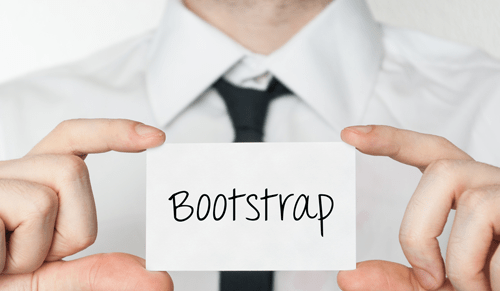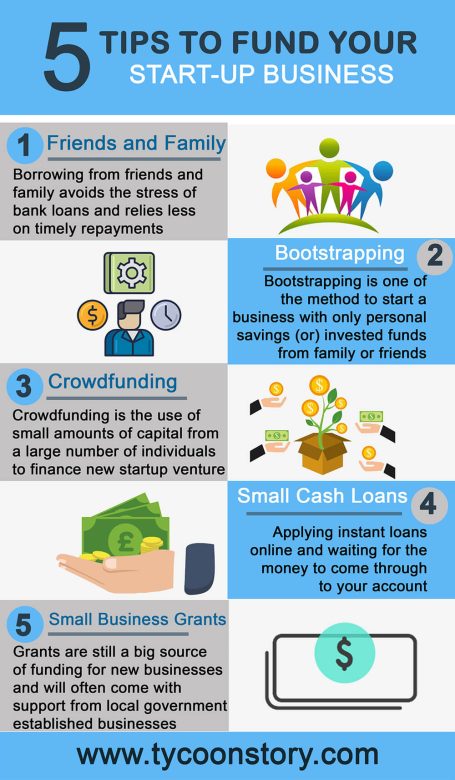If you’ve plans to become the successful entrepreneur you’ve always dreamed of, it goes without saying that a lot of time and effort will need to go into the planning and financing of your new business venture, but you needn’t feel daunted by the prospect. With the right guidance and financial backing, you can make a real success of your start-up.
Starting any new business will require legally registering your business, marketing yourself to the public, employing staff and making sure you’re insured for all aspects of the start-up. But most importantly, you’ll need to secure stable funding before you get going. We’ve consolidated five of the handiest tips for obtaining the funds you need to get started on your dream and really kick-start your life.
1. Friends and Family
Friends and family are often the first port of call for those looking to seek funds for their start-up. Borrowing from friends and family avoids the stress of bank loans and relies less on timely repayments. Business loans and personal bank loans require you to make regular fixed repayments, which if missed, can negatively impact your credit score. If your credit score is in bad shape, it will be harder to secure credit in the future, as marks against your name can stay with you for years.
Hopefully, friends and family will be more likely to lend to you as they’ll believe in your cause wholeheartedly. However, borrowing from family or friends can spoil relationships if either side are unhappy with the repayment amounts or schedule. It can be easier than using a loans organisation or bank but be careful with how the lending is managed.
2. ‘Bootstrapping’
Bootstrapping is another term for using your existing assets to fund a start-up. Using any savings that you already have is a good way of finding cash quickly, without having to borrow large amounts of money and thus repay it. Personal credit, such as that accrued by credit cards or small loans, can be used to fund any part of your venture.
It would be beneficial to run checks on your credit score before using personal finances. A bad credit score will prevent you from securing loans further down the line. If you’re struggling with personal finances before starting a business, it is possible to access no credit check loans in the U.K.
3. Crowdfunding
Crowdfunding is an increasingly common way to secure cash for a start-up business. The mainstream method of securing funds through investors has been flipped upside down by allowing the start-up a platform for promotion and investment. Fundable.com have produced an incredibly useful guide to crowdfunding. The benefits of crowdfunding are many.
Crowdfunding sites use social media to their advantage. By using this method, you will be promoting your business before the money is even secured! This will allow you to have a wider reach when your business is up and running. Crowdfunding also eliminates the need for multiple applications to different lenders, meaning that your efforts are more focussed and polished.
However, Crowdfunding is becoming an increasingly saturated market. It can be difficult to find the support from investors through Crowdfunding beyond your friends and family. Startup Grind have said that it’s difficult to generate enough buzz about your venture to secure enough money through Crowdfunding.
4. Small Cash Loans
Getting a small cash loan is by far one of the easiest methods of sourcing funding for your start-up business. Securing no credit check loans in the U.K. can be as easy as applying online and waiting for the money to come through to your account. They are hassle-free, and if you’ve recently relocated to the U.K and are yet to build up any credit, or simply have bad credit then this type of loan can be a highly useful funding tool. With no credit check loans in the U.K, approval is subject to affordability, focussing much less on your credit score. So, you should be able to secure the money for your new venture relatively quickly. Be wary of making late repayments, though. You don’t want to damage your credit score even further.
5. Small Business Grants
Business grants can be secured from the U.K. government and certain private investors, as long as you meet certain criteria. Grants can be as little as £500 and as large as £100,000 depending on the venture. However, the larger the grant, the more complex the application process and criteria will be. Many grant offers will come with a condition that you match the funding like for like. If you’re already spread thin financially, these can sometimes be futile.
Entrepreneur Handbook details some of the grants available to small businesses here, with FreshBooks providing a handy 2021 update to small business grants which takes account changes due to COVID-19.
Grants are still a big source of funding for new businesses as it is essentially free money and will often come with support from local government and established businesses. However, make sure you read the conditions of the grants carefully as they may require some form of repayment. Grants are incredibly difficult to secure, and a lot of time can be wasted during the application process but if successful in acquiring are a huge boost for any start-up business.
Starting a new business is an overwhelming but exhilarating task for anyone that decides to take it on. Prior to getting your business up and running, securing the funds can seem like a difficult task. Borrowing from friends and family is a way to secure funds without the strict repayment schedules that other lenders may impose but can lead to strained relationships. Crowdfunding is a thoroughly 21st Century method of sourcing capital, but it can be difficult to create enough noise to stand out against other start-ups. Using your own cash may be difficult if you don’t have a lot of savings. Business grants from government are difficult to secure but can pay off massively if you’re successfully. Finally, small cash loans are an easy way to secure cash but just be careful of repayment schedules.






